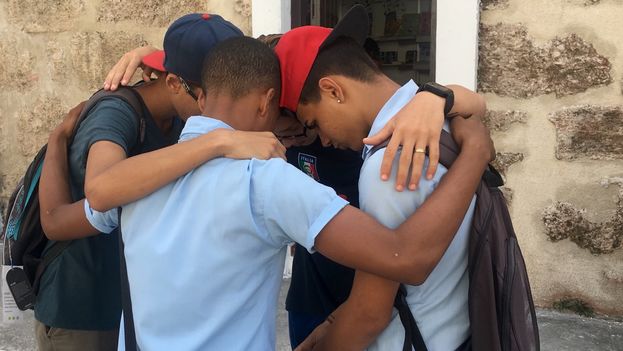
![]() 14ymedio, Yoani Sanchez, Havana, 28 July 2017 — The man forms a trumpet with his hands in front of his mouth to warn of the presence of an informant. It is a transcendental gesture warning not to blab in a daily life were people constantly appeal to body language, obscene words and metaphors. Failing to do so leads to jokes, scares those selling things under the table, and generates mistrust among friends.
14ymedio, Yoani Sanchez, Havana, 28 July 2017 — The man forms a trumpet with his hands in front of his mouth to warn of the presence of an informant. It is a transcendental gesture warning not to blab in a daily life were people constantly appeal to body language, obscene words and metaphors. Failing to do so leads to jokes, scares those selling things under the table, and generates mistrust among friends.
The official media is expressing concern about the deterioration in Cubans’ oral expression. Several television spots in recent weeks have tackled the shouts and rude terms that fill talk on the street. Journalists attribute this poverty of vocabulary to the family and insist that the epidemic of vulgarities that plagues the country is incubated at home.
Another culprit pointed to is reggaeton. The songs loaded with lust and machismo cultivate an expression filled with denigrating concepts and sexual allusions, say the specialists who speak on these TV programs. According to the opinions of these sociologists and psychologists – linguist are seldom invited – listening to acts such as El Palo Divino makes teens utter more insults per minute.
So far, each one of the analyses aired has failed to point to any institutional responsibility for verbal degradation. They ignore that for decades everyone who has spoken “nicely” and has dared to pronounce all the letters in every word has been labeled “unpopular,” “arrogant” or “lacking in humility.”
Foul language is a distinctive feature of the revolutionary language that has been imposed in Cuba since January 1959. Since then, expressing oneself with the rudeness of a stevedore has become one of the many strategies that opportunists assume to disguise themselves as proletarians. Offending others has also been fashionable in this political uproar established in the country more than half a century ago.
Now, the authorities are shocked because young people insert a bad word in every sentence they utter. They blush for the constant allusions to sexual organs in conversation, a real trifle compared to the using the derogatory gusano, worm, against a political opponent, as was coined and promoted by the government.
After accusing those concerned about the correct use of language of being bourgeois, now they are afraid of this vulgar generation that was born of so many verbal castrations. After pursuing the free and frank word, today from government institutions, they complain of the incoherent monosyllables that so often arise when these children of censorship are asked about politics, human rights or the leaders of the country.
Many years ago, here, talking stopped being a way to communicate and instead become the fastest way to relax. Not only does expressing an opinion cause problems, but the style in which it is expressed can also be a source of conflict. Understanding the danger of articulate language has been one of the most successful survival mechanisms developed by Cubans in the times we have been living in.
Not recognizing the implication of the political system in this linguistic deterioration is another way of doing damage to the vocabulary… by not calling things by their names.
